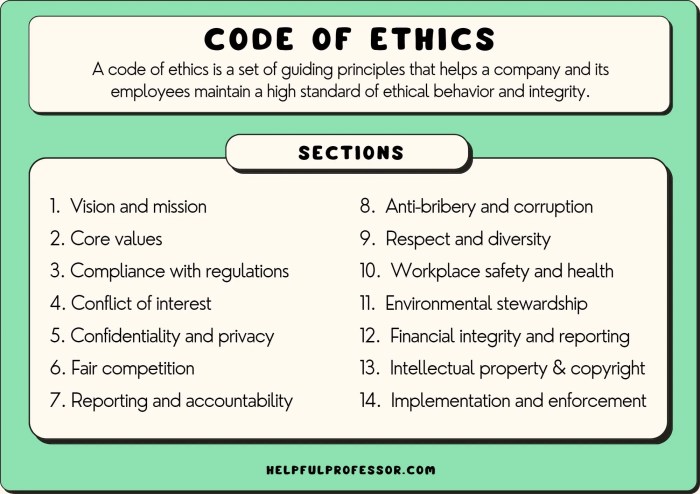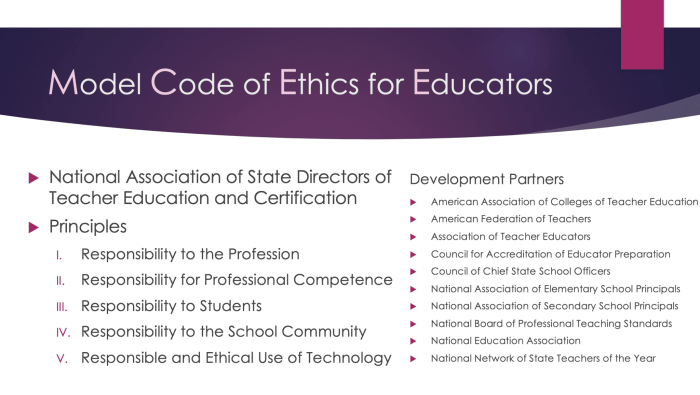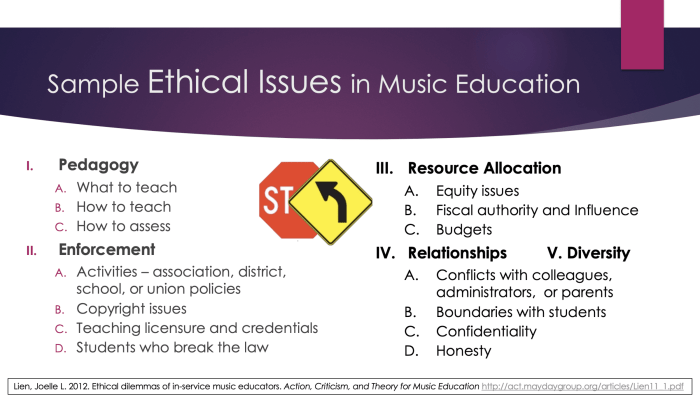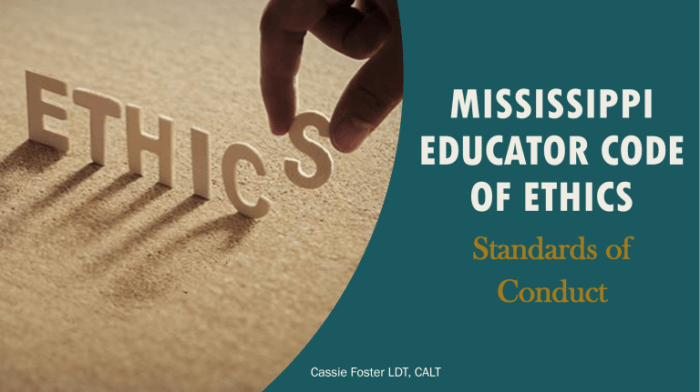The Mississippi Educator Code of Ethics serves as a comprehensive guide for educators in the state, outlining the ethical principles and responsibilities that govern their conduct. This code provides a framework for ethical decision-making, ensuring that educators uphold the highest standards of professionalism and integrity in their interactions with students, colleagues, the community, and society.
The code encompasses a wide range of ethical considerations, including the fostering of a positive learning environment, the protection of student well-being, the maintenance of professional boundaries, the resolution of conflicts, and the promotion of civic engagement. By adhering to these ethical principles, educators can create a safe, equitable, and inspiring learning environment for all students.
Principles of the Mississippi Educator Code of Ethics
The Mississippi Educator Code of Ethics establishes a framework for the ethical conduct of educators in the state. It is based on the fundamental principles of:
- Integrity:Educators must maintain high ethical standards and act with honesty, fairness, and responsibility.
- Respect:Educators must treat students, colleagues, parents, and the community with respect and dignity.
- Responsibility:Educators must fulfill their professional responsibilities to students, the community, and the profession.
- Confidentiality:Educators must maintain the confidentiality of student and family information.
- Professionalism:Educators must maintain a professional demeanor and avoid engaging in conduct that could compromise their position.
These principles guide educators in their daily interactions and help them navigate ethical dilemmas. For example, if an educator is faced with a situation where a student is struggling academically, the code of ethics would require them to provide support and resources to the student while maintaining confidentiality and treating the student with respect.
Ethical Dilemmas
Educators may face ethical dilemmas in their practice. The code of ethics provides guidance on how to navigate these situations. Some common ethical dilemmas include:
- Confidentiality:Educators must balance the need to maintain student confidentiality with the obligation to report suspected child abuse or neglect.
- Grading:Educators must ensure that grades are fair and accurate, even when faced with pressure from students or parents.
- Student discipline:Educators must maintain a fair and consistent approach to student discipline while respecting the rights of students.
- Professional boundaries:Educators must maintain appropriate professional boundaries with students, colleagues, and parents.
- Bias:Educators must avoid bias or discrimination in their interactions with students.
By following the principles of the code of ethics, educators can navigate these ethical dilemmas and maintain a high level of professionalism.
Responsibilities to Students

Educators have an ethical obligation to create a supportive and nurturing learning environment for their students. They must prioritize students’ well-being and foster their academic, social, and emotional growth.
Respecting students’ privacy and maintaining confidentiality are crucial aspects of an educator’s ethical responsibilities. Educators must safeguard students’ personal information and only disclose it when necessary, with the student’s consent or as required by law.
Fostering a Positive Learning Environment
- Creating a welcoming and inclusive classroom where all students feel respected and valued.
- Encouraging student participation, creativity, and critical thinking.
- Establishing clear expectations and providing constructive feedback to promote student growth.
- Providing a safe and orderly learning environment free from discrimination, harassment, or violence.
Protecting Student Well-being
- Recognizing and responding to signs of distress or difficulty among students.
- Providing support and resources to students facing academic, social, or emotional challenges.
- Maintaining appropriate boundaries and avoiding any actions that could compromise student safety or well-being.
- Reporting any suspected child abuse or neglect to the appropriate authorities.
Confidentiality and Privacy
- Maintaining the confidentiality of student records and information.
- Only disclosing student information with the student’s consent or as required by law.
- Respecting students’ privacy in online and social media interactions.
- Avoiding sharing personal information about students with others outside of a professional context.
Responsibilities to Colleagues and the Profession

Educators have ethical obligations towards their colleagues and the teaching profession. These obligations include maintaining professional boundaries, resolving conflicts ethically, and supporting colleagues in their professional development.
Maintaining Professional Boundaries
Educators must maintain appropriate professional boundaries with colleagues, students, and parents. This includes respecting personal space, avoiding inappropriate physical contact, and refraining from engaging in romantic or sexual relationships with colleagues or students.
Resolving Conflicts Ethically, Mississippi educator code of ethics
Conflicts are a natural part of any workplace, including schools. Educators must resolve conflicts ethically by addressing issues directly, communicating respectfully, and seeking resolution through appropriate channels.
Supporting Colleagues
Educators should support their colleagues in their professional development. This includes providing constructive feedback, sharing resources, and mentoring new teachers. Educators should also create a positive and supportive work environment for their colleagues.
Responsibilities to the Community and Society: Mississippi Educator Code Of Ethics

Educators have ethical responsibilities that extend beyond the classroom to the broader community and society. They play a vital role in shaping the values and beliefs of future citizens and have a duty to promote civic engagement and social responsibility.
Educators should actively engage with the community, fostering partnerships and collaborations that benefit both students and the community. They should participate in community events, serve on local boards and committees, and volunteer their time to support local organizations. By doing so, they demonstrate the importance of civic participation and model responsible citizenship for their students.
Promoting Civic Engagement
Educators have a responsibility to promote civic engagement among their students. This involves teaching students about the importance of participating in the democratic process, understanding their rights and responsibilities as citizens, and developing the skills necessary for effective civic participation.
- Educators can incorporate civic education into their curriculum, teaching students about government, history, and current events.
- They can organize mock elections, debates, and other activities that simulate the democratic process.
- They can encourage students to volunteer in their communities and participate in youth organizations that promote civic engagement.
Fostering a Sense of Social Responsibility
Educators also have a responsibility to foster a sense of social responsibility among their students. This involves teaching students about the importance of empathy, compassion, and service to others. It also involves helping students develop the skills necessary to make a positive contribution to society.
- Educators can incorporate social responsibility into their curriculum, teaching students about social issues, diversity, and global citizenship.
- They can organize service-learning projects that allow students to apply their learning to real-world problems.
- They can encourage students to participate in extracurricular activities that promote social responsibility, such as volunteering, peer tutoring, and community service.
By promoting civic engagement and fostering a sense of social responsibility among their students, educators can help create a more just, equitable, and democratic society.
Enforcement and Consequences
The Mississippi Educator Code of Ethics is enforced through a collaborative effort involving the Mississippi Department of Education (MDE), local school districts, and the Mississippi Ethics Commission.
When allegations of ethical violations are made, the MDE investigates and determines if there is sufficient evidence to warrant further action. If so, the case may be referred to the local school district for disciplinary proceedings or to the Mississippi Ethics Commission for further investigation and possible sanctions.
Potential Consequences
Educators who violate the Mississippi Educator Code of Ethics may face a range of consequences, including:
- Verbal or written reprimand
- Suspension from teaching duties
- Revocation of teaching license
- Criminal charges (in cases of serious misconduct)
The specific consequences imposed will depend on the severity of the violation and the educator’s prior disciplinary record.
Case Studies and Examples

This section provides real-life case studies and hypothetical scenarios that illustrate the application of the Mississippi Educator Code of Ethics in different contexts.
The table below presents these case studies, along with the ethical issue involved, the relevant principle from the code of ethics, and the appropriate resolution.
Case Studies and Ethical Considerations
| Case Study | Ethical Issue | Code of Ethics Principle | Resolution |
|---|---|---|---|
| A teacher discovers that a student is being bullied by other students. | Failure to protect students from harm | Responsibility to Students: Protect the health and safety of students | The teacher reports the bullying to the school administration and takes steps to ensure the student’s safety. |
| A teacher is asked by a parent to change a student’s grade. | Compromising academic integrity | Responsibility to Students: Maintain high standards of academic integrity | The teacher refuses to change the grade and explains the school’s grading policy to the parent. |
| A teacher posts inappropriate comments about students on social media. | Violation of student privacy | Responsibility to Students: Respect the privacy of students | The teacher removes the comments and apologizes to the students involved. |
| A teacher is offered a bribe by a parent in exchange for giving their child preferential treatment. | Accepting bribes | Responsibility to Colleagues and the Profession: Maintain ethical conduct | The teacher reports the bribe to the school administration and refuses to accept it. |
Resources and Support
Educators facing ethical dilemmas or seeking guidance in adhering to the code of ethics can access various resources and support systems.
Professional organizations, ethics committees, and other relevant bodies provide educators with a range of support mechanisms, including:
Professional Organizations
- Mississippi Association of Educators (MAE)
- National Education Association (NEA)
- American Federation of Teachers (AFT)
Ethics Committees
- Mississippi Ethics Advisory Committee for Educators
- National Association of State Boards of Education (NASBE) Ethics Committee
- American Association of Colleges for Teacher Education (AACTE) Ethics Committee
Other Relevant Bodies
- Mississippi Department of Education
- Mississippi Professional Educators (MPE)
- Mississippi Bar Association
FAQ
What are the key principles of the Mississippi Educator Code of Ethics?
The key principles include fostering a positive learning environment, protecting student well-being, maintaining professional boundaries, resolving conflicts, and promoting civic engagement.
What are the responsibilities of educators towards their students?
Educators have a responsibility to create a safe and supportive learning environment, respect student privacy, and foster their intellectual and personal growth.
How does the code of ethics guide educators in their interactions with colleagues?
The code emphasizes the importance of maintaining professional boundaries, resolving conflicts respectfully, and supporting colleagues in their professional development.